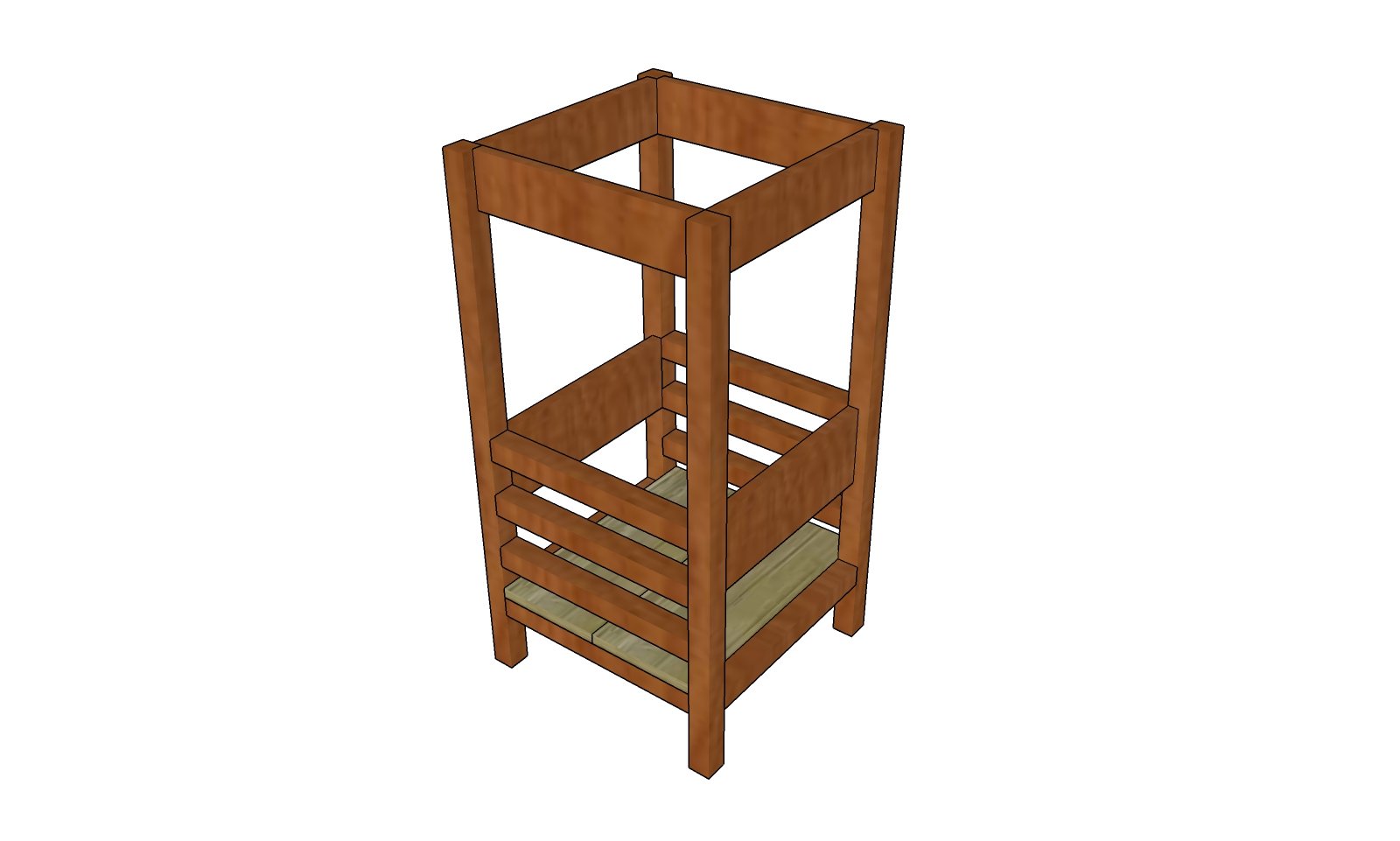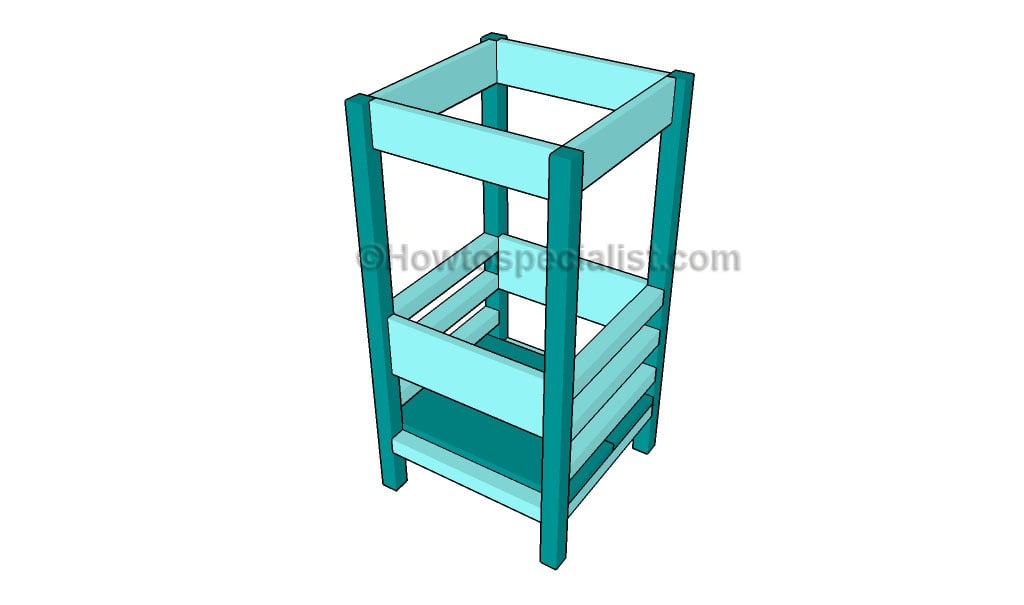This step by step diy woodworking project is about learning tower plans. If you want to build a nice help chair for your kid, we suggest you to check out the instructions described in this article. If it is necessary, we also recommend you to adjust the size and the shape of the tower to suit your needs perfectly. Work with attention and lock all the components in a professional manner.
There are quite a few designs to choose from when building the learning tower, so make sure you take all the plan into account before starting the actual construction project. Mark the cut lines on the components and adjust them at the right size with a sharp circular saw. It is highly important to use quality lumber when building the components, so buy cedar, pine or redwood.
You can add a few decorative pieces to the tower if you want to enhance its look. However, we recommend you to sand the sharp edges and to round the top of the posts before letting your kids to use the tower, otherwise they might easily injure. In addition, check if the whole structure is highly rigid. Plumb the posts with a spirit level and add a few coats of paint to make it stand out. See all my Premium Plans in the Shop.
Made from this plan
Learning tower plans
Materials
- A – 4 pieces of 2×2 lumber – 36″ long FRAME
- B – 2 pieces of 2×2 lumber – 15″ long, 2 pieces of 1×8 lumber – 18″ long, 2 pieces of 1×2 lumber – 15″ long FLOORING
- C – 2 pieces of 1×6 lumber – 15″ long SIDES
- D – 8 pieces of 2×2 lumber – 15″ long SIDE BRACES
- E – 4 pieces of 1×6 lumber – 15″ long TOP BRACES
- 3 pieces of 2×2 lumber – 10 ft
- 1 piece of 1×6 lumber – 8 ft
- 1 piece of 1×8 lumber – 3 ft
- 1 piece of 1×2 lumber – 3 ft
- 2 1/2″ screws
- 1 1/4″ screws
- glue, stain
- wood filler
Tools
- Safety gloves, glasses
- Miter saw, jigsaw
- Chalk line, tape measure, spirit level, carpentry pencil
- Drill machinery and drill bits
Tips
- Apply several coats of wood stain to the wooden components
- Fill the holes with wood filler and smooth the surface
Time
- One Day
Related
Learning tower plans
The first step of the project is to build the sides of the learning tower. As you can easily notice in the image, we recommend you to use 2×2 lumber for all the components.
Continue the project by locking the sides of the table together as shown in the image. Therefore, we recommend you to cut the 2×2, 1×6 and 1×4 components at the right size before fitting them into place. Drill pocket holes at both ends of the components, plumb the legs and lock them into place with galvanized screws.
Building the floor of the tower is a straight forward process, but you need to pay attention to the instructions described in the image. Lay the slats on a level surface and lock them together with two supports, making sure you don’t leave any gaps between them.

Learning tower plans
Last but not least, we recommend you to take care of the finishing touches. Fill the holes with wood filler and let it to dry out for several hours. Afterwards, smooth the wooden surface with fine-grit sandpaper and vacuum the residues.
Thank you for reading our project about learning tower plans and we recommend you to check out the rest of the projects. Don’t forget to share our projects with your friends and LIKE us, by using the social media widgets, if you want to be the first that gets our latest articles.






7 comments
What types/size of screws did you use? how many did you use to secure each section?
2 1/2″ pocket screws for the 2×2 lumber and 1 1/4″ pocket screws for the 1×6 lumber. Two screws for each joint.
Several missing pieces in your plans:
1. Materials List doesn’t include the 2″ x 2″ lower crosspieces (floor supports).
2. The diagram shows “E” but there is no “E” included in your Materials List.
3. The lumber shown on your Materials List for the floor does not add up to the finished floor measurements provided in the “Building the floor” diagram.
Actually the floor measurements are two sections that are 3″ and one section that is 9″. Then there are the two 1×2 pieces of lumber. 1″x 2″ lumber dimension are actually not the true dimension. the 2″ measurement is actually 1 1/2″ and the 1″ measurement is actually 3/4″. All the measurements for the floor do add up to 18″, when on paper it looks as if they would be 19″. I was checking the dimensions myself as I am building this for my grandson. Hope that helps.
If the tower height is to be 36″ then the math doesn’t work on all the parts. If you add up all the dimensions from floor to the top of the post you get 46.5″ not 36″ as called for in the plans. I realized that after I had all the parts planed and cut. Bummer
It does add, you need to use the nominal size of the materials. for example 1x4s are 0.75 x 3.5 in
I agree with Jack if the plans called for 1x4s at the top; however, the plans call for 1×6’s. After buying and cutting the lumber, I had to simply adjust the 14.5″ spacing to 12.5″